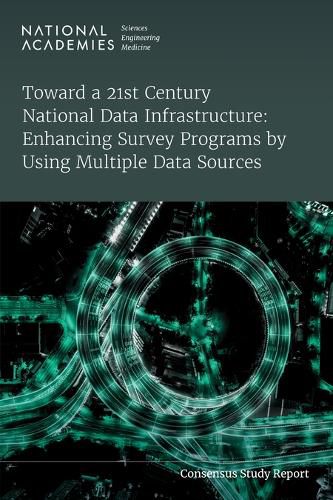Toward a 21st Century National Data Infrastructure: Enhancing Survey Programs by Using Multiple Data Sources
National Academies of Sciences, Engineering, and Medicine, Division of Behavioral and Social Sciences and Education, Committee on National Statistics, Panel on the Implications of Using Multiple Data Sources for Major Survey Programs

Toward a 21st Century National Data Infrastructure: Enhancing Survey Programs by Using Multiple Data Sources
National Academies of Sciences, Engineering, and Medicine, Division of Behavioral and Social Sciences and Education, Committee on National Statistics, Panel on the Implications of Using Multiple Data Sources for Major Survey Programs
Much of the statistical information currently produced by federal statistical agencies - information about economic, social, and physical well-being that is essential for the functioning of modern society - comes from sample surveys. In recent years, there has been a proliferation of data from other sources, including data collected by government agencies while administering programs, satellite and sensor data, private-sector data such as electronic health records and credit card transaction data, and massive amounts of data available on the internet. How can these data sources be used to enhance the information currently collected on surveys, and to provide new frontiers for producing information and statistics to benefit American society?
Toward a 21st Century National Data Infrastructure: Enhancing Survey Programs by Using Multiple Data Sources, the second report in a series funded by the National Science Foundation, discusses how use of multiple data sources can improve the quality of national and subnational statistics while promoting data equity. This report explores implications of combining survey data with other data sources through examples relating to the areas of income, health, crime, and agriculture.
Table of Contents
Front Matter Summary 1 The Promise of Integrated Data 2 Types of Data and Methods for Combining Them 3 Using Multiple Data Sources to Enhance Data Equity 4 Creating New Data Resources with Administrative Records 5 Data Linkage to Improve Income Measurement 6 Data Linkage to Supplement Health Surveys 7 Combining Multiple Data Sources to Measure Crime 8 Using Multiple Data Sources for County-Level Crop Estimates 9 Combining Data Sources for National Statistics: Next Steps References Appendix A: Workshop Agenda Appendix B: Biographical Sketches of Panel Members Committee on National Statistics
This item is not currently in-stock. It can be ordered online and is expected to ship in approx 4 weeks
Our stock data is updated periodically, and availability may change throughout the day for in-demand items. Please call the relevant shop for the most current stock information. Prices are subject to change without notice.
Sign in or become a Readings Member to add this title to a wishlist.


